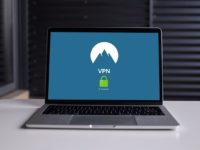Guest post by Monica Rewutzer
Do you know what this year really doesn’t need to top it all off? Getting hacked. Unfortunately, cybercriminals have taken advantage of all the confusion and terror of the last few months to actually increase how often they’re targeting people in the UK.
The statistics are startling. Each week the National Cyber Security Centre stops 60 “major cyber-attacks” while putting down millions of email threats.
With major year-of-year increases, we can only anticipate 2021 to be even worse. So, don’t wait until something happens to you. Start protecting yourself with these key cybersecurity tips and tools.
1. Get a VPN
VPNs have also gotten quite popular lately for other reasons—they are a great way to unblock streaming content from around the world.
If you aren’t in the know, a VPN, or virtual private network, has a few essential security features. Mainly, they both encrypt your internet connection and anonymize your IP address, which greatly reduces the size of your digital footprint.
As excellent as they are for watching HBO or Korean dramas, they are even more potent security tools to prevent hackers from tracking what you do online. Take advantage of VPN Black Friday deals to find a sweet discount on one now.
2. Enhance Your Password Security
We are all guilty of recycling our passwords. It just makes life easier! Unfortunately, what makes your life easier also makes you even more vulnerable to cybercriminals.
Since data breaches happen all the time, hackers don’t even have to directly target you (at least at first). They just wait until a list of credentials gets leaked on the dark web and then strike from there.
That’s why you need to arm yourself with unique, lengthy, and complex passwords. These are not only tougher to crack but should a hacker manage to gain access to one of your accounts, they won’t be able to use it to get into another.
Make it easy on yourself and get a password manager to store your login credentials securely in one convenient place.
3. Enable 2FA
Two-factor authentication gets a bad reputation from lazy folks (like us). With 2FA, you generate a one-time passcode sent to your SMS or email.
While this extra step may be annoying, it can make the difference between your accounts getting hacked or not. So, turn it on!
2FA creates a valuable second line of defense and provides you notifications about anytime somebody does try to illicitly access your account, giving you a better understanding of your overall security.
While email/SMS 2FA is pretty good, consider using a specialized app like Google Authenticator. This directly pairs login to your smartphone, which makes 2FA even more secure!
4. Use Antivirus Software
Nowadays, most of us have pretty decent built-in and free antivirus software. You may recognize the annoying pop-ups even. Look, as much as you can’t stand Windows Defender telling you it’s time to restart your computer, you should be happy.
It’s looking out for you to patch security vulnerabilities. Set it to runs always in the background and schedule maintenance when you’re not busy.
Likewise, consider going even further with dedicated antivirus tools like Norton or Kaspersky. These can proactively scan the web and even keep an eye on your identity to further enhance your security.
5. Backup Your Files
These days, one of the most prevalent types of attacks is ransomware. Ransomware is when hackers lock your out of essential files until you pay them a fee. It comes in various flavors like the famous WannaCry that started deleting files to force people to pay up more quickly.
The easiest way to defend against this type of attack is by having secure backups. Use file encryption and back up securely to the cloud and a physical storage device. Doing so protects you against the rising threat of UK hackers and other issues like hardware or software failure.
And similar to software updates and antivirus scans, you can schedule this for off-peak hours, so you never have to interrupt what you’re doing.
Protect Yourself From UK Cyber Threats
The number of cyber threats in the UK is continuing to rise. But protecting yourself neither has to be expensive nor difficult.
All of the tips and strategies we mentioned are not only extremely affordable but easy to implement. So, don’t wait any longer and start integrating them into everything you do now!





